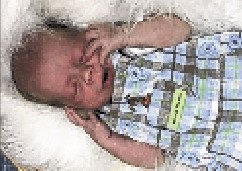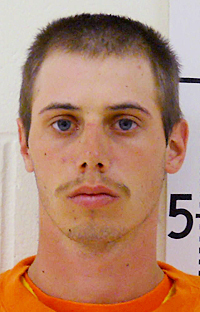A nurse who failed to notify authorities about suspicious injuries on a 10-week-old baby who later died at his father’s hands will no longer be licensed to practice nursing in Maine.
Virginia McNamara is the first health care worker to be punished by the state in connection with the 2012 death of Ethan Henderson of Arundel.
McNamara, who worked for Home Health Visiting Nurses, voluntarily surrendered her license, according to an agreement completed Tuesday with the Maine State Board of Nursing, which said that several health care professionals, including McNamara, who were required to report signs of abuse had failed to do so.
A complaint against Ethan’s pediatrician alleging the same neglect was dismissed by the board that licenses osteopathic doctors. Dr. Lisa Gouldsbrough was issued a letter of guidance, but not disciplined, according to the baby’s grandfather, who filed the complaint and attended the hearing where it was addressed.
Ethan’s father, Gordon Collins-Faunce, is serving a 20-year prison term for manslaughter in his son’s death. Collins-Faunce, 23 at the time, lost his temper while caring for the boy at the family’s home in Arundel on May 5, 2012. The boy suffered head injuries that left him in a coma and died at a hospital three days later.
The state’s Child Protective Services division had been alerted that the child might be the victim of abuse by an anonymous telephone call and visited the child’s home three days before the boy was fatally injured, according to an investigation by the Office of Child and Family Services. The division “made a preliminary safety decision that Ethan was safe,” the report said.
Close examination after his death found that Ethan had a number of previous injuries indicating a pattern of abuse. His grandfather, Irving Faunce of Wilton, who is Collins-Faunce’s father, pledged to seek justice.
“One of the promises I made to Ethan is I would work to hold accountable all components of the system that had contributed to his death – that includes DHHS, all caregivers, all (health care) providers and all physicians … those who in our opinion and judgment had failed,” he said.
Faunce was startled to learn Friday that the visiting nurse’s license had been revoked, but that the pediatrician – whom he said had more information at her disposal – wasn’t sanctioned.
“I’m glad the board of nursing had the courage and exercised its responsibility to hold a nurse accountable,” he said. “We’re certainly disappointed in the Board of (Osteopathic) Licensure.”
BROKEN BONES SEEN AS A RED FLAG
A letter of guidance means there is evidence to support a complaint, but does not warrant discipline. Instead, the board offers recommendations for avoiding such problems in the future.
One of the injuries that Ethan sustained before his death was a broken arm. Ethan’s mother, Christina Henderson, told health care providers and family members that it was the result of Ethan’s arm being stuck between the slats of his crib when his father picked him up along with the blankets that were covering him.
Broken bones in an infant that can’t walk are a red flag for abuse.
“When we learned about the fracture we assumed it was being reported,” Faunce said.
But the injury was never reported to the Department of Health and Human Services’ Child Protective Services division.
The nursing board’s complaint against McNamara says that the nurse, along with other health care professionals, became aware of Ethan’s injuries and failed to report them to the Department of Health and Human Services.
“During the course of the investigation, it was determined that several mandated reporters failed to report obvious or suspected signs of child abuse,” the report says, noting that Ethan and his twin, Lucas, had “healing rib fractures, head injuries, bruising on the upper arms and an ankle fracture.”
SEVERAL HAD SEEN BOY’S INJURIES
McNamara was conducting regular family visits on behalf of Home Health Visiting Nurses after Ethan and Lucas were born prematurely.
McNamara, who now lives in Florida and could not be reached for comment, submitted written testimony to the nursing board in which she said Ethan was seen on a regular basis by his pediatrician, emergency room doctor, other emergency personnel and an orthopedic surgeon. The report does not name any of those individuals.
The report says McNamara became aware Ethan had a broken bone in his left arm on March 28, 2012. On April 17, 2012, she saw three oblong bruises on his arm. She said she spoke with her agency supervisor about the bruises, who responded: “In 30 years of pediatric nursing experience, ER personnel typically report suspicious fractures to DHHS.” According to the report, the supervisor also said that other adults in the house and regular visits to the pediatrician provided a safety net for the child.
McNamara’s Maine nursing license had lapsed in December 2012. She had held a Maine nursing license since 1978.
The agreement says McNamara violated standards of professional behavior, negligently caused physical injury to a patient and can no longer practice as a nurse in Maine.
The complaint against McNamara arose out of information provided to the nursing board by the Maine State Police and the Maine Attorney General’s Office, according to the board’s report. The complaint against Gouldsbrough was brought by Ethan’s grandfather, who was given a copy of the letter she wrote in response to the complaint.
It is unclear whether complaints have been brought against other health care professionals in the case because complaints are confidential unless upheld by the relevant board. Gouldsbrough’s defense against the complaint outlined the steps she took to care for Ethan and why she didn’t suspect abuse. It also describes the toll the case has taken on her.
“With the benefit of hindsight and imaging studies, the full extent of the horrors here were revealed, with a searing, tragic and haunting outcome,” she wrote. “I carry Ethan’s memory with me every day and this informs my interactions with all my patients and their caregivers.”
PEDIATRICIAN: NO CLEAR ABUSE
Gouldsbrough described eight separate interactions with Ethan since he was born on Feb. 21, 2012, and several communications between the family and members of her staff.
On March 21, 2012 – the day after a well-baby checkup – Ethan’s mother called to say her son’s arm had been injured. She was told to come in right away.
Gouldsbrough said the fracture lacked the typical characteristics of an abuse injury. Still, she referred Ethan to an orthopedic surgeon. According to her defense, the surgeon told Gouldsbrough that the boy didn’t need to see a specialist. She referred him to a second specialist, Dr. Vincent Oliviero, according to paperwork submitted in the case before the board. He found no evidence of abuse and said in his report: “The family is quite forthright in explaining the mechanism of injury, so I doubt that there is non-accidental trauma.”
In another instance, Ethan had a slightly bulging anterior fontanelle, the space between forming bones in the skull, as well as a fever, and cried when his neck moved. Gouldsbrough worried the child might have meningitis and sent him to Maine Medical Center for tests, which were negative. Gouldsbrough said she would have been more worried about bleeding on the brain stemming from abuse if Ethan hadn’t been running a fever.
Ethan’s parents always presented themselves well and were attentive, she said. Christina Henderson made eye contact when describing Ethan’s injuries, Gouldsbrough said.
A statement submitted in the hearing by the grandfather’s lawyer, William McKinley, said Gouldsbrough had more information than the other health professionals, enough to suspect abuse and refer it to state authorities.
‘STILL A LOT OF TOUGH QUESTIONS’
Faunce considered taking action against the Department of Health and Human Services, but ultimately decided against it.
“We investigated thoroughly and determined we didn’t have grounds to go much further,” Faunce said during an interview this summer. “As far as we could determine they did what they had to do. Did that satisfy us? Not really. There are still a lot of tough questions out there.”
Calls seeking comment made to the Maine State Board of Nursing, Gouldsbrough and Home Health Visiting Nurses were not returned Friday.
Ethan’s death did lead to changes in state law. Now, professions that are mandated to report suspected child abuse, such as doctors, teachers and child care providers, are obligated to report any bone fractures in children who can’t yet walk.
There also was an increase in the number of confirmed cases of child abuse reported in 2012 and 2013, which some experts have attributed in part to high-profile cases like Ethan’s.
Ethan’s twin, Lucas, has been adopted and is thriving in a loving home, Faunce said. He turned 2 in February. His grandparents get to see him regularly.
Copy the Story LinkSend questions/comments to the editors.




Success. Please wait for the page to reload. If the page does not reload within 5 seconds, please refresh the page.
Enter your email and password to access comments.
Hi, to comment on stories you must . This profile is in addition to your subscription and website login.
Already have a commenting profile? .
Invalid username/password.
Please check your email to confirm and complete your registration.
Only subscribers are eligible to post comments. Please subscribe or login first for digital access. Here’s why.
Use the form below to reset your password. When you've submitted your account email, we will send an email with a reset code.